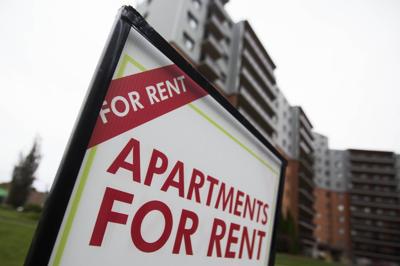About 28 per cent of people who have experienced homelessness in Canada were evicted at some point in their life, while seven per cent of the general population has experienced an eviction, a new report says.
The findings are part of a three-part series on evictions by Canada Mortgage and Housing Corp. (CMHC) examining the links between eviction and homelessness, vulnerable groups and health inequities.
Among the key findings were that Black renters are overrepresented in eviction cases — making up 15 per cent of the racialized population but about 25 per cent of evictions among racialized people — and that people who have experienced eviction report the lowest levels of physical and mental health.
Aled ab Iorwerth, CMHC’s deputy chief economist, said the studies were in response to growingÌýconcerns about eviction in Canada.
“We were not sure there had been enough analysis on it in Canada,” he said. “We were also unsure about the state of the data, so what we tried to do was get up to speed and trying to understand what the basic facts and implications are.”
Some reported being evicted and homeless in the same year
The study onÌýhomelessness,Ìýwhich examined data from the Canadian Housing Survey and focused on 2021, found about 19 per cent of households that reported being evictedÌýsaid they experienced “hidden homelessness” that same year, meaning they slept at their friends’ or families’ homes.
A percentage “too small to report”Ìýexperienced “absolute homelessness,” meaning they stayed in a shelter, outdoors, or in a vehicle, it said.
About 10 per cent of people who said they experienced hidden or absolute homelessnessÌýin 2021 reported being evicted that same year,Ìýthe study said.
Overall, the report said, most people who are evicted don’t experience homelessness, but research suggests eviction can put some people at greater risk of homelessness.
Previous research on the subject has found disabled people were more likely than others to have experienced homelessness after eviction, it said
The report noted that the Canadian Housing Survey collects information from a “sample of households in Canada,” but the sample doesn’t includeÌýpeople currently experiencing homelessness, living in institutions or in “collective dwellings” like seniors’ homes or student residences. It cited this as a data limitation.Ìý
Race, gender and immigration status affect eviction rates
The second study, on vulnerableÌýpopulations, found immigrants in Ontario have higher eviction rates compared to non-immigrants than any other province.ÌýAmong immigrants across the country who experienced an eviction, 46 per cent lived in Ontario. Meanwhile, about 38 per cent of Canadian-born respondents lived in Ontario.
The study combined analysis of Canadian Housing Survey data for 2021 and 2022, results from the Canadian Social Survey and a review of research on evictions in Canada and the United States.
Indigenous people were also disproportionately affected by eviction, it found, representing about four per cent of all renters but six per cent of people evicted.
There were different experiences based on gender, the study said, especially when factoring in race, age and family type. Among the key findings on the subject were that women often face financial hardship once they’re separated from their spouse, and that domestic violence or abuse has led “directly or indirectly” to eviction.
Additionally, families with young children appeared to have higher rates of eviction in Canada, it said, though most of the research is based on the U.S.
Past CMHC-funded research had identified older adults, newcomers and particularly refugees, children and youth, and people with mental health and addiction issues as populations vulnerable to eviction.
Health conditions can increase risk of eviction
The third report, which combined existing research with 2021 and 2022 Canadian Housing Survey data analysis, found that health conditions can increase the risk of eviction, and eviction itself can worsen health.Ìý
The likelihood of eviction more than doubled for those who reported havingÌýwith a “higher degree” of disability on the survey, itÌýsaid.
The study identified people with mental health conditions or substance use issues and older adults as groups that face greater risk of eviction.
Mental health conditions can put someone at greater risk of eviction by affecting their ability “to make routine rent or utility payments or maintain a safe residential space with neighbours and property owners,” it said.
When facing eviction, it added, rentersÌýwith pre-existing conditions can become even more vulnerable to depression, suicide and substance use.
People who use substances are also at higher risk becauseÌýlandlords can evict tenants if they suspect illegal activity in their rental unit. Plus,Ìýviolent behaviour brought on by substances could result in police and medical interventions, which the report said can also often result in eviction.
The process of eviction can put substance users atÌýhigher risk of physical, cognitive and mental health complications and death.
Older adults may experience “cognitive, physical and mental health decline,” putting them at risk of eviction for forgetting to pay rent or not being able to maintain their home.
If evicted, they face higher risk of cognitive, physical and mental health decline and of moving away from “informal caregivers who are important for their care.”
“Health supports are an important part of eviction prevention,” the report said, calling for better support before, during and after an eviction.
Support could include connecting tenants with resources and services that can better support them and designing housing supply and services that better support tenants’ complex needs, it said.






























To join the conversation set a first and last name in your user profile.
Sign in or register for free to join the Conversation